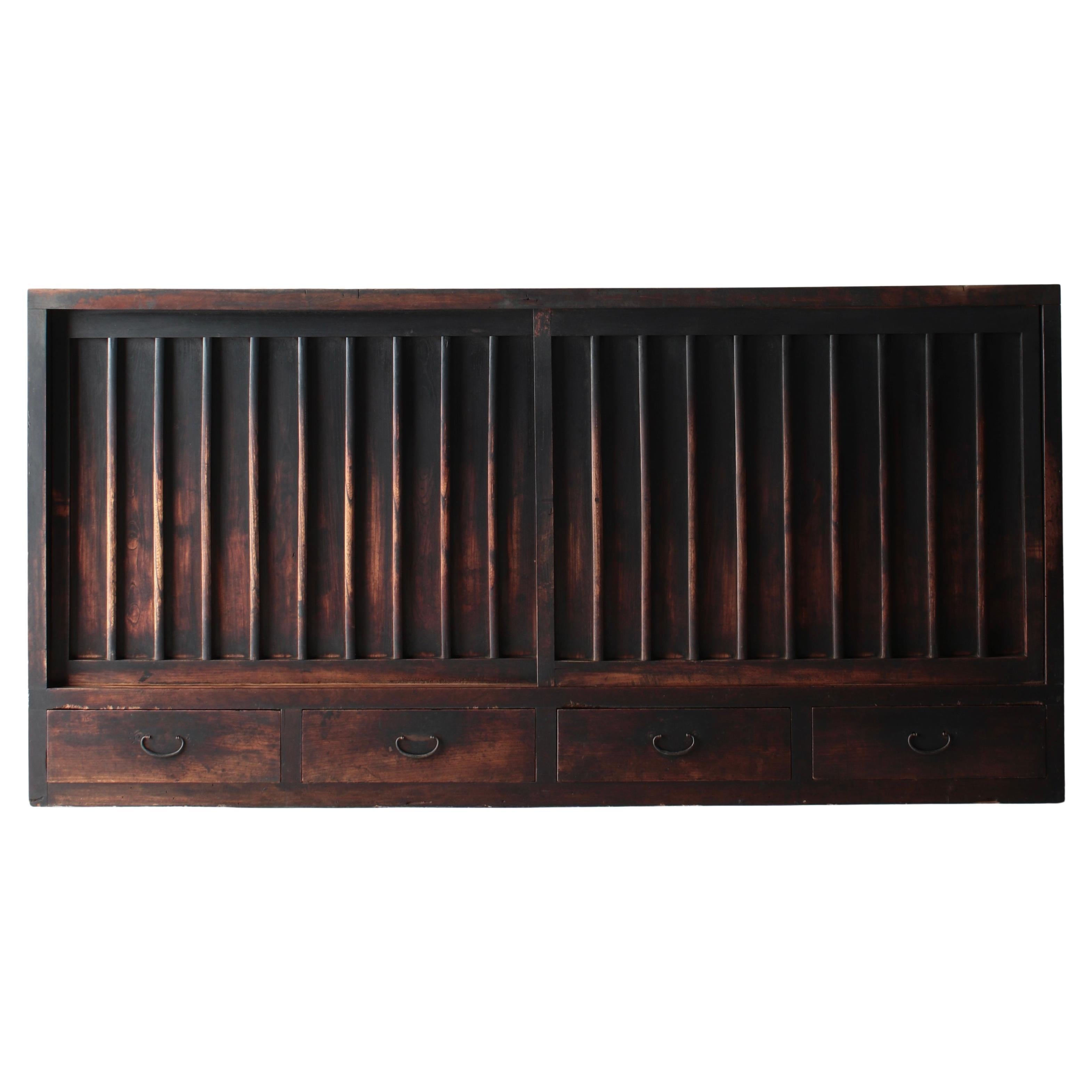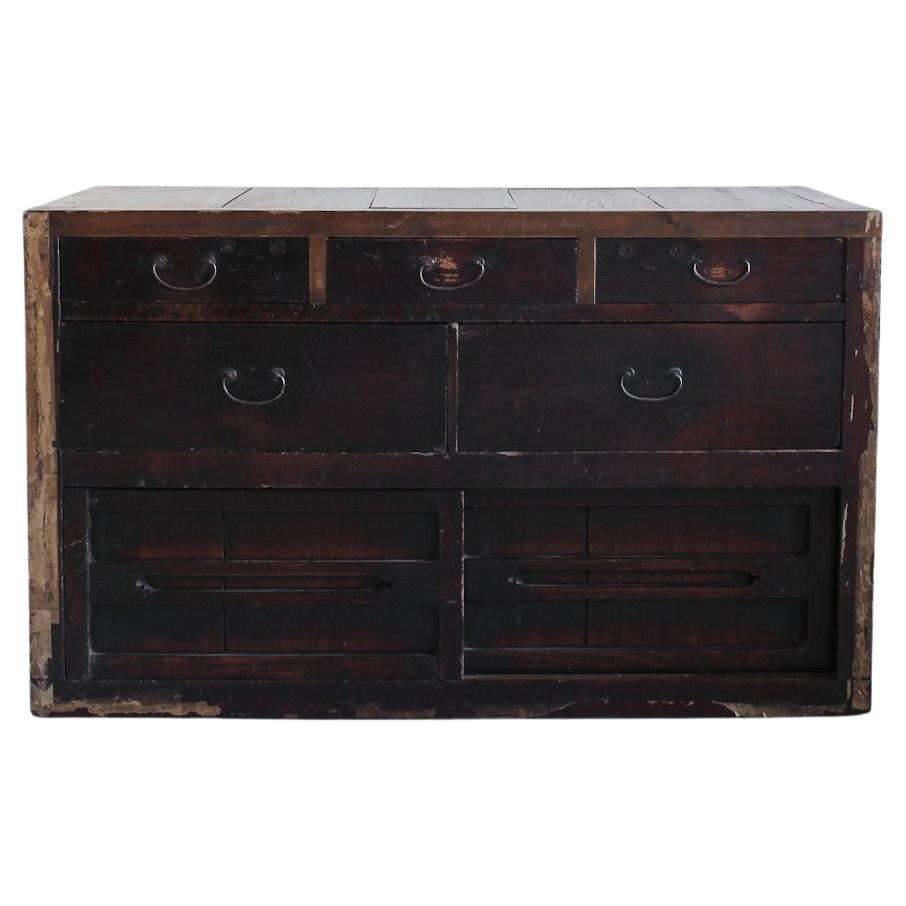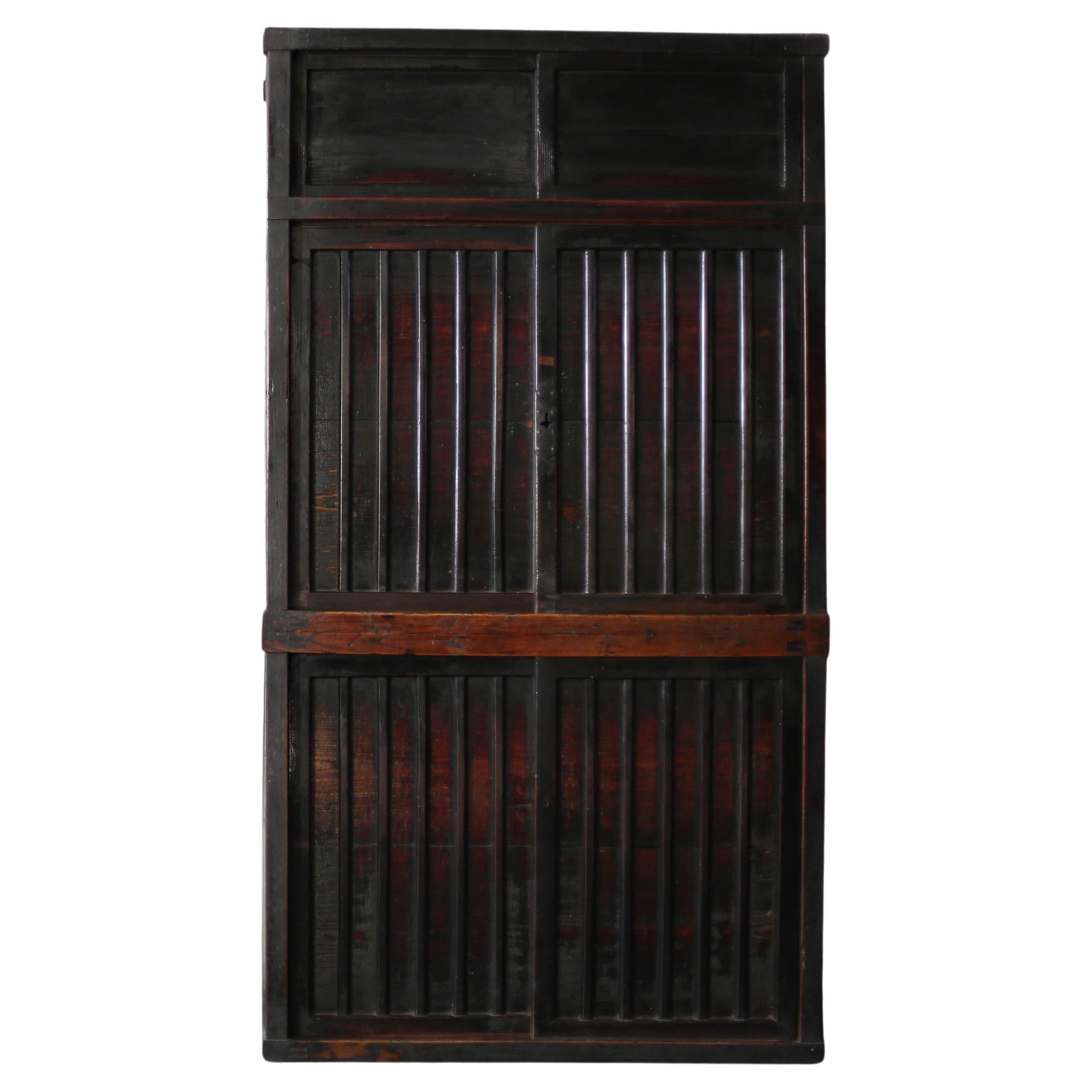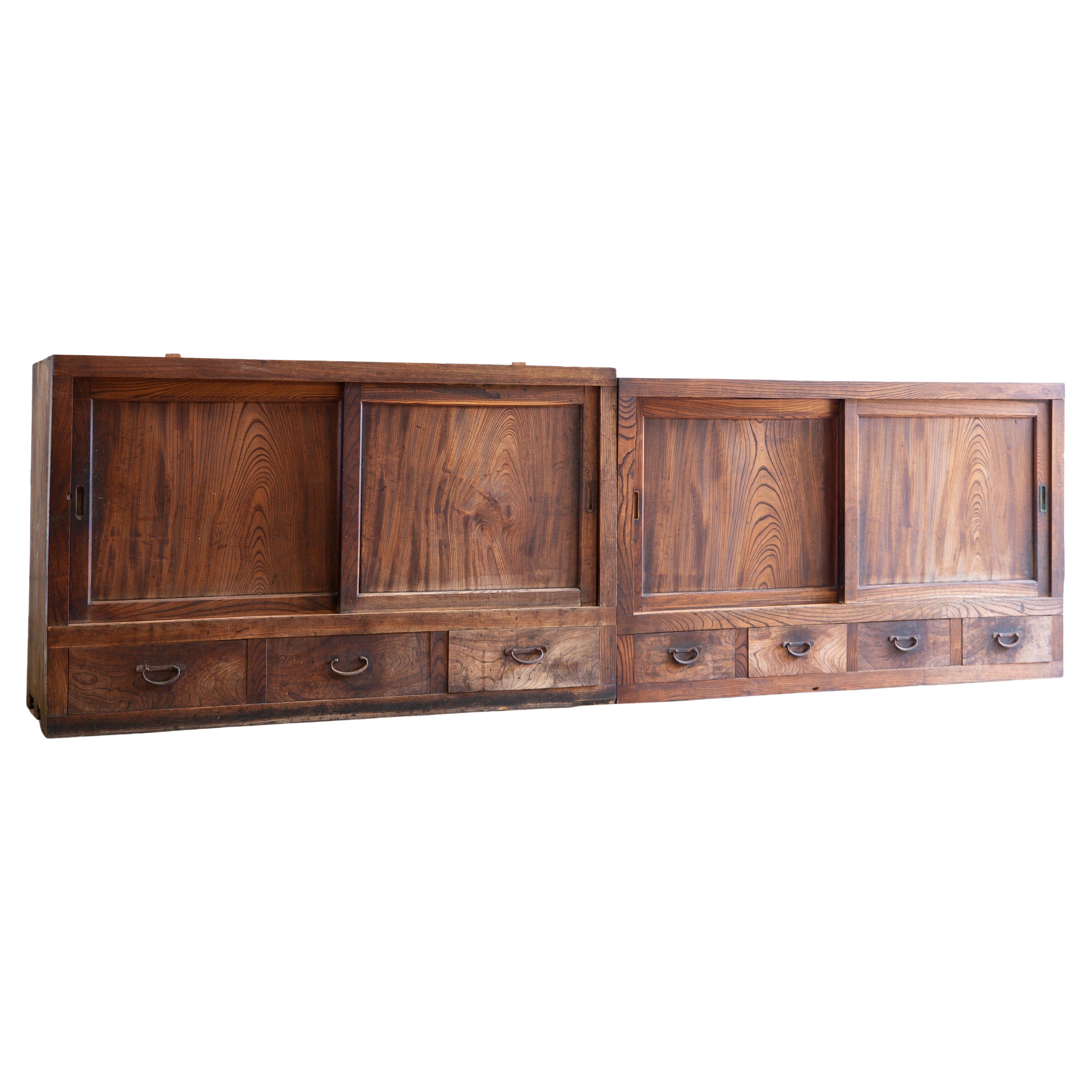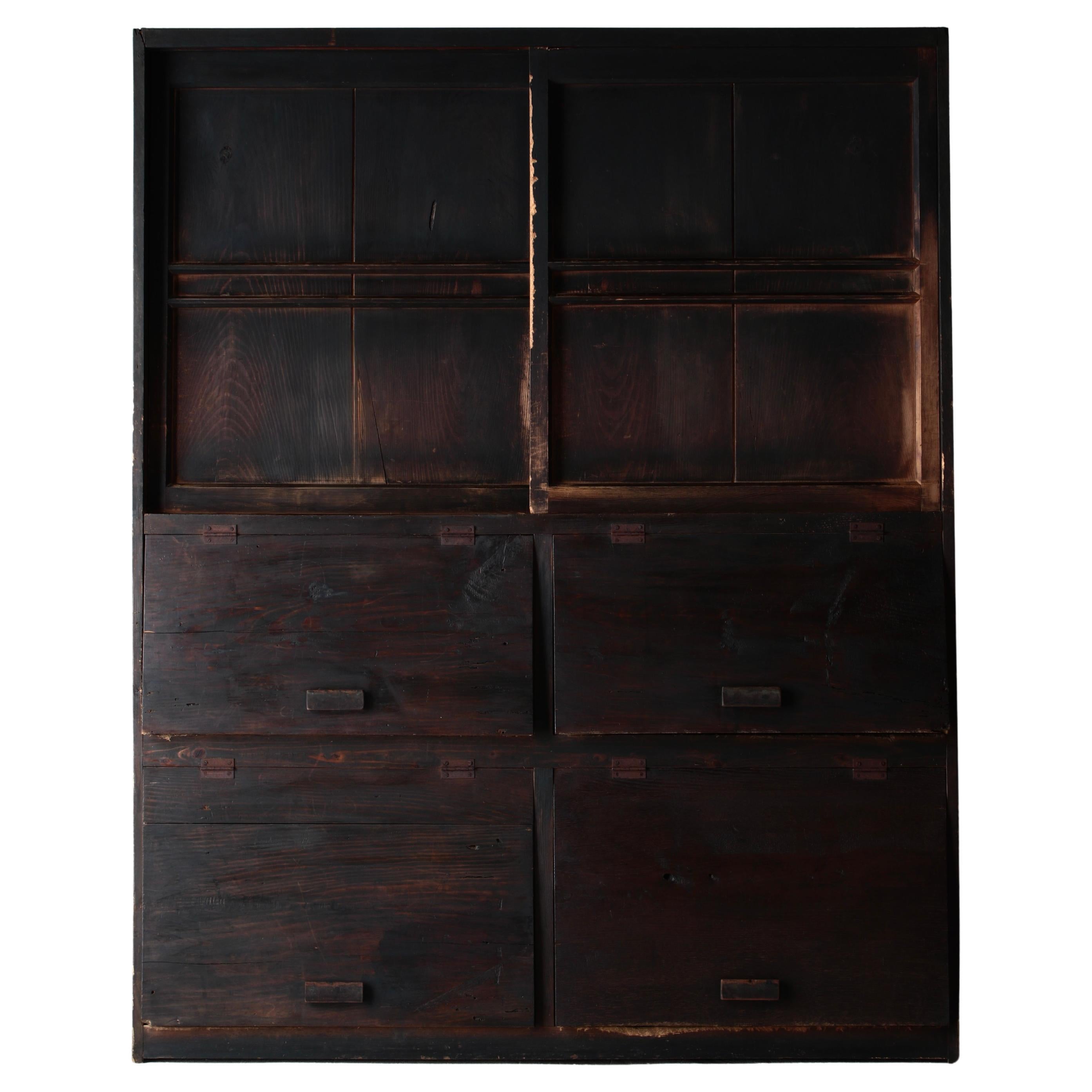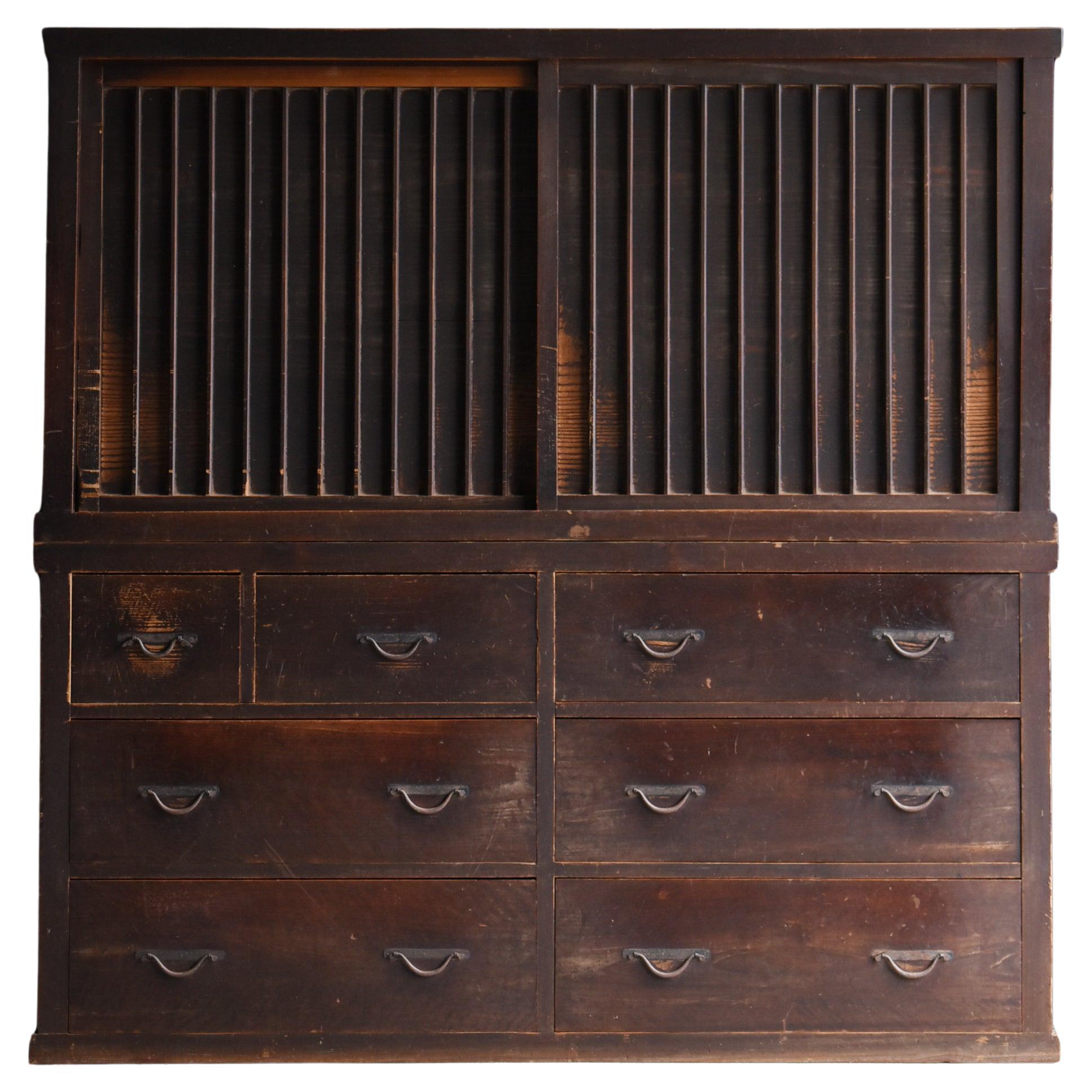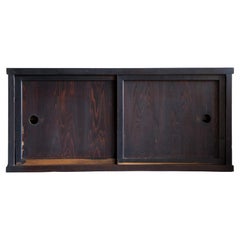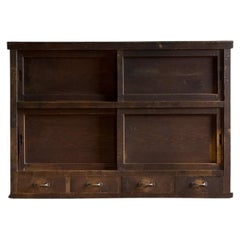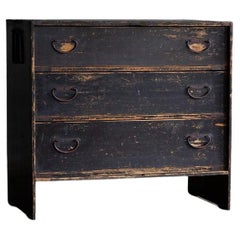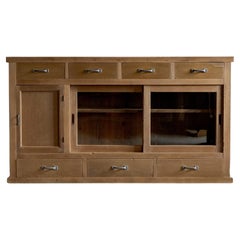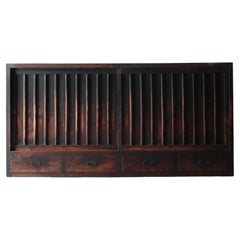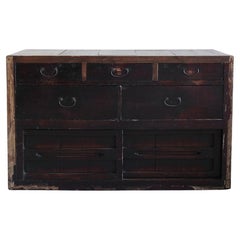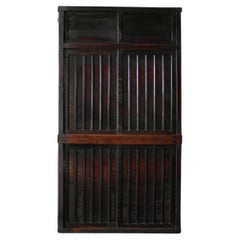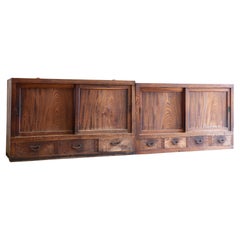Items Similar to Japanese Antique Large Mizuya Tansu, Meiji Era '1868–1912', Wabi Sabi
Want more images or videos?
Request additional images or videos from the seller
1 of 21
Japanese Antique Large Mizuya Tansu, Meiji Era '1868–1912', Wabi Sabi
$4,000
£3,073.05
€3,530.90
CA$5,626.50
A$6,321.12
CHF 3,302.79
MX$77,152.17
NOK 41,935.82
SEK 39,473.74
DKK 26,348.90
About the Item
This antique large Mizuya Tansu was crafted in the Meiji Era (1868–1912).
Finished with traditional Japanese urushi lacquer, the surface has deepened to a rich black over time, showcasing a beautiful patina that evokes the spirit of wabi-sabi. The front features sliding doors with vertical slats, adding a quiet yet striking presence.
Mizuya Tansu, originally designed as a kitchen chest, was used for storing tableware and cooking utensils. With its generous depth and sturdy construction, this piece remains highly functional—ideal for use as a cupboard, sideboard, or display cabinet.
Its bold form and dark, aged finish make it a stunning accent in both modern and traditional interiors, blending utility with timeless Japanese character.
The piece has been carefully washed with water.
The doors and drawers move smoothly.
As an antique piece, minor scratches and marks may be present, each adding to its unique charm and the story it tells over time. It has been carefully inspected and remains in excellent antique condition, with natural signs of age that enhance its character.
The interior dimensions are as follows (in inches, with centimeters in parentheses):
Sliding door compartment: W62.3" × D20.9" × H20.9" (W158.2 cm × D53 cm × H53.2 cm)
Drawer: W18.3" × D20.8" × H7.8" (W46.5 cm × D52.8 cm × H19.7 cm)
Weight :115.3lbs(52.3kg)
Shipping Information
We ship from Japan. I will provide my own shipping quote. Please ask.
- Dimensions:Height: 34.73 in (88.2 cm)Width: 66.78 in (169.6 cm)Depth: 24.57 in (62.4 cm)
- Style:Meiji (Of the Period)
- Materials and Techniques:
- Place of Origin:
- Period:
- Date of Manufacture:1868–1912
- Condition:Refinished. Wear consistent with age and use. Cleaned thoroughly with water. We have conducted a meticulous check for any broken or damaged areas and found no issues. The doors and drawers move smoothly.
- Seller Location:Hitachiomiya-shi, JP
- Reference Number:1stDibs: LU7430246098562
About the Seller
5.0
Platinum Seller
Premium sellers with a 4.7+ rating and 24-hour response times
Established in 2019
1stDibs seller since 2022
65 sales on 1stDibs
Typical response time: <1 hour
- ShippingRetrieving quote...Shipping from: Hitachiomiya, Japan
- Return Policy
Authenticity Guarantee
In the unlikely event there’s an issue with an item’s authenticity, contact us within 1 year for a full refund. DetailsMoney-Back Guarantee
If your item is not as described, is damaged in transit, or does not arrive, contact us within 7 days for a full refund. Details24-Hour Cancellation
You have a 24-hour grace period in which to reconsider your purchase, with no questions asked.Vetted Professional Sellers
Our world-class sellers must adhere to strict standards for service and quality, maintaining the integrity of our listings.Price-Match Guarantee
If you find that a seller listed the same item for a lower price elsewhere, we’ll match it.Trusted Global Delivery
Our best-in-class carrier network provides specialized shipping options worldwide, including custom delivery.More From This Seller
View AllJapanese Antique Large Tansu, Panel Doors, Meiji Era 1868-1912, Wabi Sabi
Located in Hitachiomiya-shi, 08
This antique large Mizuya Tansu was crafted in the Meiji Era (1868–1912).
Its simple sliding panel doors and dark, timeworn finish reflect the quiet beauty of wabi-sabi. The surface...
Category
Antique Mid-19th Century Cabinets
Materials
Cedar
Japanese Antique Cabinet"Mizuya Tansu", Early Showa Period '1926-'
Located in Hitachiomiya-shi, 08
This antique cabinet was crafted in the Early Showa Period (1926-).
Known as a “Mizuya Tansu,” this traditional Japanese kitchen cabinet was ...
Category
Early 20th Century Japanese Showa Cabinets
Materials
Cypress
Japanese Antique Chest of Drawers "Tansu", Meiji Era '1868–1912'Wabi Sabi
Located in Hitachiomiya-shi, 08
This antique chest of drawers was crafted in the Meiji Era (1868–1912).
Made of Japanese cedar and finished with urushi (Japanese lacquer), it has developed a beautifully weathered ...
Category
Antique Late 19th Century Japanese Meiji Commodes and Chests of Drawers
Materials
Cedar
Japanese Antique Storage Cabinet"Mizuya Tansu", Early Showa Period '1926-'
Located in Hitachiomiya-shi, 08
This antique cabinet was crafted in the Early Showa Period (1926–).
It was originally used as a traditional Japanese kitchen cabinet, or Mizu...
Category
Early 20th Century Japanese Showa Cabinets
Materials
Cypress
Japanese Antique Chest of Drawers, Early Meiji Era'1868-'Wabi Sabi
Located in Hitachiomiya-shi, 08
This antique chest of drawers was crafted in the Early Meiji Era (1868-1912) .
The gently worn finish, along with its beautifully weathered urushi (Japanese lacquer), reveals the pa...
Category
Antique Late 19th Century Japanese Meiji Commodes and Chests of Drawers
Materials
Wood
$800 Sale Price
50% Off
Japanese Antique Small Chest of Drawers, Meiji Era '1868–1912', Wabi Sabi
Located in Hitachiomiya-shi, 08
This antique small chest of drawers was crafted in the Meiji Era (1868-1912).
Its compact size makes it an ideal addition to any space, offering both practicality and unique charac...
Category
Antique Late 19th Century Japanese Meiji Commodes and Chests of Drawers
Materials
Cedar
You May Also Like
Japanese Antique Large Tansu / Cabinet Sideboard / 1868-1912s Wabi-sabi
Located in Iwate-gun Shizukuishi-cho, Iwate Prefecture
This is an old Japanese cabinet.
It is estimated that it was around the Meiji period, and the main parts are all made of zelkova. It is speculated that everything made of zelkova wa...
Category
Antique Late 19th Century Japanese Meiji Cabinets
Materials
Iron
A Large Early Meiji Period Wabi Sabi Japanese Tansu/Sideboard
Located in London, GB
A large early Meiji period Japanese tansu/sideboard
A really nice mid/late 19th C. Japanese sideboard/tansu.
It was likely to be used as a coun...
Category
Antique 19th Century Japanese Meiji Sideboards
Materials
Cedar
Japanese Antique BK Large Cabinet 1860s-1900s / Tansu Wabisabi
Located in Sammu-shi, Chiba
This account consists of 5 companies.
I specialize in selecting and carefully selecting Japanese antiques.
With 20 years of experience, I will re-propose Japanese antiques from a new...
Category
Early 20th Century Japanese Meiji Cabinets
Materials
Cedar
1860s-1910s Japanese antique 2 tier Large Mizuya tansu chest wabi sabi organic
Located in 常陸大宮市, JP
This large 2 tier Mizuya tansu / side board, is a product of 1860s - 1910s (Meiji period), estimate from the style & conditions.
Originally made with traditional wood joinery without...
Category
Antique Late 19th Century Japanese Meiji Cabinets
Materials
Wood, Hardwood
Japanese Antique Large Tansu / Cabinet Cupboard / 1868-1912s Wabi-sabi
Located in Iwate-gun Shizukuishi-cho, Iwate Prefecture
This is an old Japanese tansu.
It was used in the Tohoku region around the Meiji period, and the main material is pine wood.
It is believed to have originally been used as a cupboa...
Category
Antique Late 19th Century Japanese Meiji Cabinets
Materials
Wood, Cedar, Chestnut, Pine
Japanese Antique Large Stacking Tansu 1860s-1920s / Cabinet Wabisabi
Located in Chōsei District Nagara, JP
This is a Stacking Tansu made in Japan.
It was made between the Meiji and Taisho periods (1860s-1920s), and is a traditional storage furniture with Japanese craftsmanship.
The materi...
Category
Early 20th Century Japanese Meiji Cabinets
Materials
Iron
More Ways To Browse
Kai Kristiansen Rosewood Tambour Door
Kent Coffey China Cabinet
Pennsylvania House China Cabinet
Tomlinson China Cabinet
Gianfranco Ferre Home Five Points
Henredon Maple Burl
Jl Treharn
Manheim Ruseau
Pacifica Cabinet
Vintage Wire Locker
Vittorio Lombardi
Drexel Cabinet Curio
Drexel Heritage Consensus
Drexel Heritage Wall Unit
Microscope Slide Cabinet
Antique Milners Safe
Dodo Skeleton
Florence Knoll Bureau
